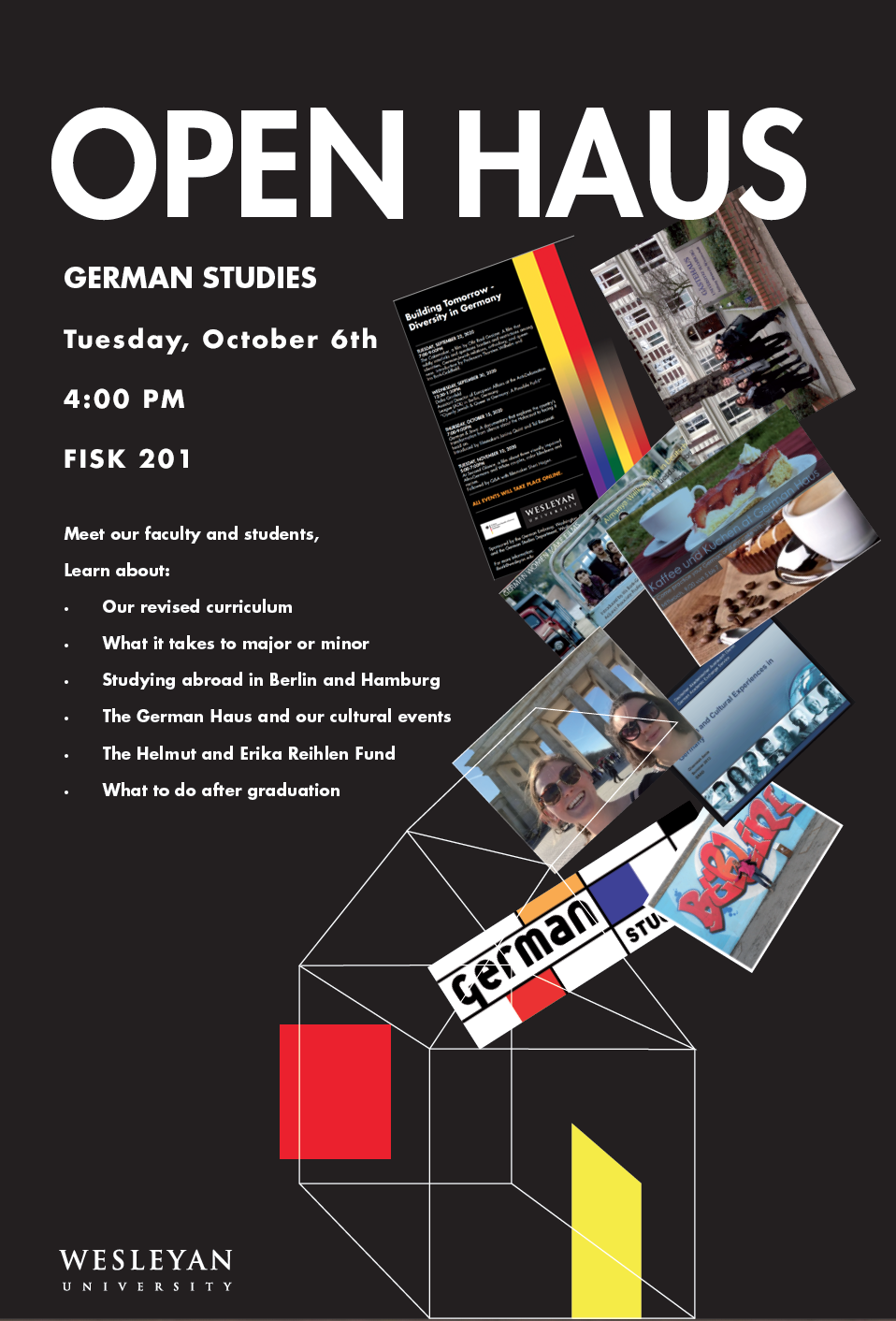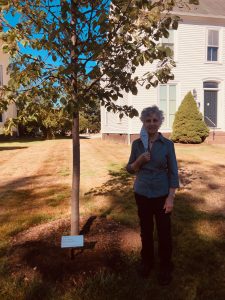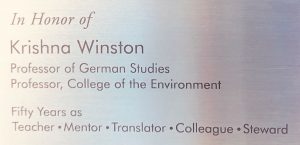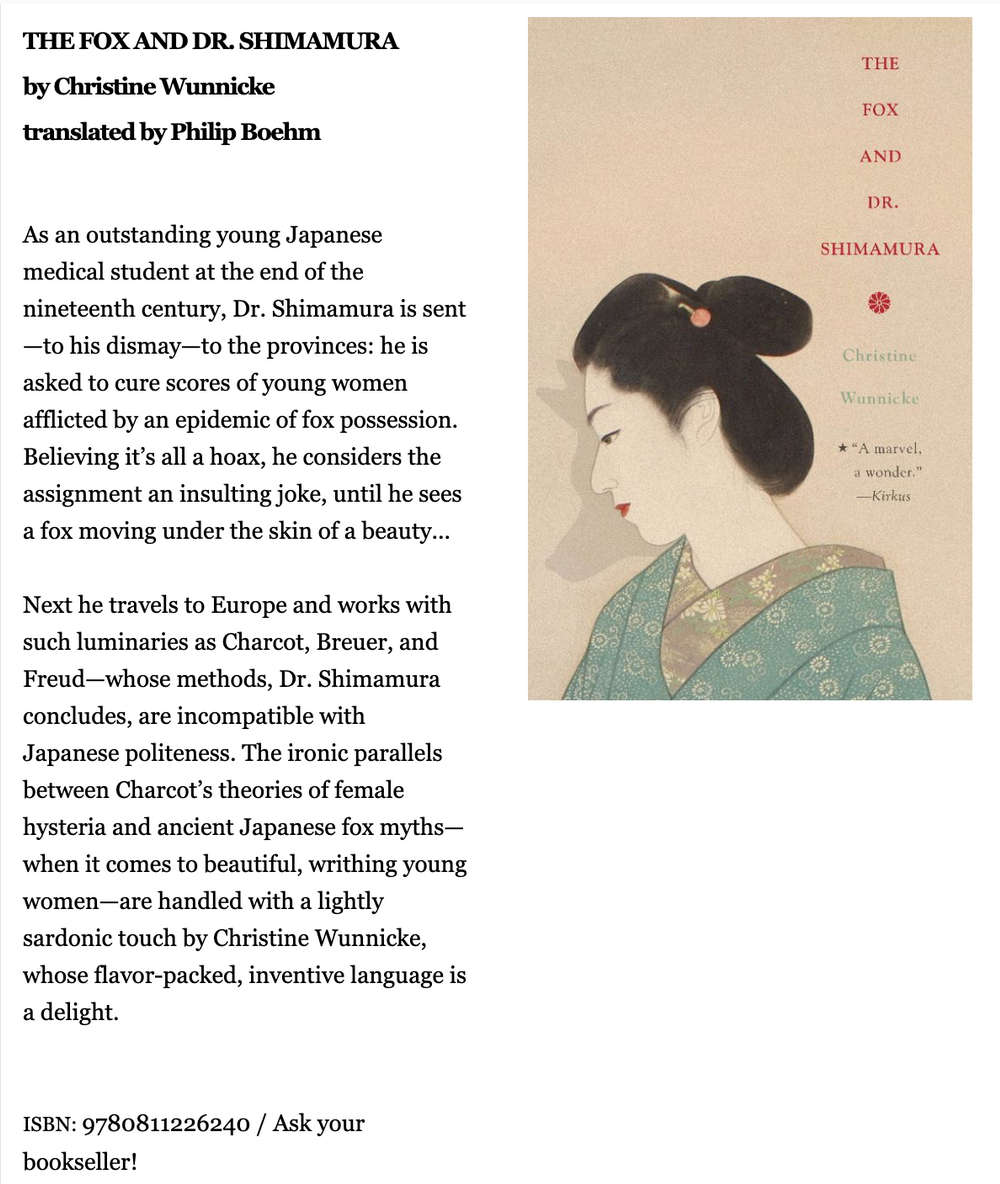- Anna Tjeltveit: German Rap, Adriano letzte Warnung
- Jenna Lacey: Left Wing Political Parties in Germany
- Yasemin Schmitt: Art in Germany during the Nazi-Era
- Hannah Landel: German Poetry
- Jules White: German Media Recommendation
This is the inaugural episode of the WesGerman podcast.
Many, many thanks to Pablo Puente for the original music throughout.
To subscribe to this podcast, copy and paste the URL into the podcast app of your choice. If you have comments or suggestions please contact the podcast producers at germanpodcast@wesleyan.edu.

https://wesleyan.zoom.us/j/94819852066?pwd=OG90TEFHYXlxbHppZG9vSm9WVW41QT09
Meeting ID: 948 1985 2066
Passcode: 921831
More information about the film and its filmmakers http://germansandjews.com/
On Wednesday, October 7, 2020 Elisabeth Lauffer ’07 participated in a Zoom discussion,  sponsored by East End Books Ptown, with Lea Singer, the author of Der Klavierschüler – The Piano Student, which Elisabeth recently translated for New Vessel Press. Singer’s novel draws its inspiration from love letters written by the piano virtuoso Vladimir Horowitz to his first pupil, Nico Kaufmann. which Singer discovered in a Swiss archive. In 2014 Elisabeth received the Gutekunst Prize for young translators from the Goethe-Institut. Her senior honors thesis at Wesleyan was a translation of Wladimir Kaminer’s Die Reise nach Trulala. Descriptions of her other translations can be found at www.elisabethlauffer.com.
sponsored by East End Books Ptown, with Lea Singer, the author of Der Klavierschüler – The Piano Student, which Elisabeth recently translated for New Vessel Press. Singer’s novel draws its inspiration from love letters written by the piano virtuoso Vladimir Horowitz to his first pupil, Nico Kaufmann. which Singer discovered in a Swiss archive. In 2014 Elisabeth received the Gutekunst Prize for young translators from the Goethe-Institut. Her senior honors thesis at Wesleyan was a translation of Wladimir Kaminer’s Die Reise nach Trulala. Descriptions of her other translations can be found at www.elisabethlauffer.com.


Dalia Grinfeld, Assistant Director of European Affairs at the Anti-Defamation League (ADL) in Berlin, Germany, will host a talk and Q&A about “Openly Jewish and Queer in Germany: A Possible Path?”
Based in Berlin, Ms. Grinfeld manages ADL’s programs in Europe and supports European Jewish communities in their advocacy efforts. Earlier, she worked as a Policy Advisor for the Council Presidency of the European Union. She is actively involved in women’s rights and health issues, LGBTQI inclusion and innovative democracy. Her academic background is in Political Science and Jewish Studies, which she studied at the University of Heidelberg, Buenos Aires and Herzliya.
To REGISTER please click HERE
We will sent out the Zoom link a day prior to the event to all who have registered on the above link.
For more information, please contact Iris Bork-Goldfield or Thorsten Wilhelm.
This event is sponsored by the German Embassy in Washington D.C. and the German Studies department.
This semester, Thorsten Wilhelm, Visiting Professor of German Studies, teaches the Freshmen Seminar, Holocaust Remembrance in Germany: The Third Generation. The German Studies Department congratulates Professor Wilhelm on his recently released book. Holocaust Narratives : Trauma, Memory and Identity Across Generations was published in August 2020 by the Routledge, Taylor & Francis Group.
 The publisher states that Professor Wilhelm analyzes “individual multi-generational frameworks of Holocaust trauma to answer one essential question: How do these narratives change to not only transmit the trauma of the Holocaust – and in the process add meaning to what is inherently an event that annihilates meaning – but also construct the trauma as a connector to a past that needs to be continued in the present?”
The publisher states that Professor Wilhelm analyzes “individual multi-generational frameworks of Holocaust trauma to answer one essential question: How do these narratives change to not only transmit the trauma of the Holocaust – and in the process add meaning to what is inherently an event that annihilates meaning – but also construct the trauma as a connector to a past that needs to be continued in the present?”
Professor Emeritus Murray Baumgarten, University of California, Santa Cruz and Founding Director of The Dickens Project comments, “a major achievement, bringing subtle analysis of Holocaust trauma to bear on the narratives that construct the collective discourse of its meanings. Wilhelm’s fine analysis helps us understand the continuing impact of the Shoah on ‘the memories of the future’ generated by second and third generation witnesses.”
The book is now available online at Olin Library.
Source: https://www.routledge.com/Holocaust-Narratives-Trauma-Memory-and-Identity-Across-Generations/Wilhelm/p/book/9780367442972
On August 20th, at long last, the plaque that was to accompany Krishna’s Linden Tree was installed. We thank Elizabeth Raccio, Assistant Director  of Stewardship and Donor Relations, who helped organize this work.
of Stewardship and Donor Relations, who helped organize this work.
Originally, we had envisioned a festive reception with many colleagues, friends, and alumni to witness this event and to celebrate Krishna’s retirement. But the party has to wait. Luckily, Krishna is still very active on campus, be it directing the Wasch Center or supervising tutorials, theses, and senior projects focused on German literature or on translation, and more.
The plaque was donated by the College of the Environment and the German Studies Department.
 The Center for German and European Studies at Brandeis University has been offering interesting and insightful online events.
The Center for German and European Studies at Brandeis University has been offering interesting and insightful online events.

by Lily Davis ’20
Ever since I was little, I have wanted to explore the world. Whenever an adult would ask me what I wanted to be when I grew up, I never really had an answer, except that I wanted to do something where I could travel, get to know different cultures, and feel independent and free. These desires dissipated a bit as I grew up and came to know the importance of a career that provides financial security and that does something to help others, but still I carried with me an eagerness to live in another country and to challenge myself in learning a new language and a new way of living. Now, as I look forward to a future working in psychology, I reflect upon my experience studying abroad in Hamburg, Germany, and how it exposed me to a new and exciting part of the world and provided me with a cross cultural perspective on mental health work.
When I arrived at Wesleyan University in 2016, I thought I had put all language-learning behind me. When I graduated high school, I wanted to get away from every bad German class I had been forced to take there: classes where we skipped important grammar skills and vocabulary, classes where I watched all eight Harry Potter movies dubbed in German with the English subtitles turned on. These classes discouraged me from learning German because they made me feel like I was constantly struggling without any real progress and without feeling that I could hold even the simplest of conversations.
But something surprising happened over the course of my first semester at Wesleyan: I watched my soon-to-be best friend, Hannah, become inspired by her beginner German course. She would come back from every class telling me how much fun it was and how much she was learning in such a short amount of time. I decided then that I would give German another go and enrolled in a language course for the second semester of my freshman year. I had always wanted to study abroad during my time in college, so I decided that this would be the way I would do it. I would study German hard for two and a half years and then go abroad during the spring semester of my Junior year. And you know what? I did just that.
In March of 2019, I flew across the ocean to Hamburg, Germany, to begin my semester abroad. The German university course schedule is set up slightly different from that of American universities, so I ended up taking four courses, each of which only met once a week. This freed up a lot of out-of-the-classroom time that I would not normally have had while studying at Wesleyan, and I was adamant about finding something meaningful to fill that time.
One of the things I was worried about when I decided to study abroad in Hamburg was losing the opportunity to apply for psychology internships and research positions for the summer of 2019. Because the University of Hamburg semester schedule continued into July, I had very little time after taking my final exams before I would be beginning my senior year at the end of August. As a psychology major, post-graduate fellowships and graduate school programs are very selective, and summer research experiences and internships help to make a student look like a competitive candidate. Because of the timeline of the Hamburg study abroad program, I was worried about not being able to gain that kind of experience with my shortened summer break. In an effort to find something to do during my free time, I reached out to my German Studies Professor at Wesleyan, Professor Iris Bork, and asked if she knew of any psychology-related internships or volunteer work that I could do in Hamburg. I was in luck! Frau Bork wrote me back to tell me that her father works as the treasurer for an artists’ group in Hamburg called Die Schlumper.
Die Schlumper was founded in 1980 by a Hamburg-native artist named Rolf Laute who was inspired by the art he saw being produced by the residents of the Alsterdorf institute for the handicapped. The name, Die Schlumper, comes from the name of the street on which the artists’ first studio was located: Beim Schlump.[1] Today, Die Schlumper is run by the artistic director and daughter of Rolf Laute, Anna Pongs-Laute, and includes around 30 handicapped adults who come together almost every day to work on different artistic endeavors, from charcoal drawing to acrylic painting to crocheting to linoleum printmaking. The mission of Die Schlumper is to provide a space where disabled adults can come together to create artistic works freely and independently. There is an inspiring atmosphere at the studio, one of community and creativity as well as a sense of artistic seriousness. In 1985, Die Schlumper became sponsored by an organization called “Freunde der Schlumper” (in English, “Friends of the Schlumpers) and the by the Hamburg Ministry for Labor, Health, and Social Welfare in 1993, and now it has a permanent studio and gallery in an old Hamburg meatpacking hall.[2]
Another project associated with Die Schlumper is called Die Schule der Schlumper (in English: The Schlumper School). This project began in 1995 as an idea to decorate the Louise Schroeder School in the Altona district of Hamburg.[3] This project was born as a collaboration between Die Schlumper artists and the students of this school. Named after Louise Dorothea Schroeder, an early twentieth-century politician for the Social Democratic Party of Germany, the Louise Schroeder School is a primary school for both handicapped and neurotypical students.[4] As part of Die Schule der Schlumper, school children visit Die Schlumper studio, working both independently and with the adult artists on various artistic projects.[5] This program not only allows the students to take part in artistic work, but it also exposes them to mentally and physically disabled individuals in an effort to reduce the negative stigma that surrounds them. Die Schule der Schlumper is a very important part of Die Schlumper program and works to integrate the artists’ work into the wider Hamburg community.
In 2002, Die Schlumper began a partnership with the Alsterdorf Evangelical Foundation. Alsterdorf provides aid to people with varying different disabilities. A quote from their website says, “Unser Ziel ist, dass jeder Mensch in seinem Sozialraum ein selbstbestimmtes und eigenständiges Leben führen kann. Dazu gehört auch die gleichberechtigte Teilnahme am gesellschaftlichen Leben im Stadtteil” (Our goal is that every person can lead a self-determined and independent life in their social space. This involves equitable participation in social life in the community).[6] This partnership with the Alsterdorf Evangelical Foundation provides financial support to Die Schlumper so that the artists can continue to work in their studio.
Die Schlumper is a unique organization in that it provides a space for handicapped adults to work every weekday on independent artistic projects which are then displayed in various gallery exhibits and sold to customers. The work produced by the artists of Die Schlumper is taken very seriously in the Hamburg artist community and beyond, and it receives the same treatment as the work of any other artist. The treatment of Die Schlumper artists’ work is an incredible demonstration of the power of the legitimization and authentication of art. Die Schlumper strives towards the destigmatization of disability through the respect and seriousness with which the organization handles their artists’ work.
Around the world, disabled people are mistreated, ignored, and ridiculed. An article titled “America Still Leaves the Disabled Behind” outlines the ways that disabled people are discriminated against in the United States.[7] The United States has made a lot of progress in policymaking to protect against this discrimination. The Americans with Disabilities Act was passed in 1990 and “prohibits discrimination against people with disabilities and guarantees equal opportunities for individuals with disabilities in employment, transportation, public accommodations, state and local government services, and telecommunications.”[8] But still, there continues to be existing societal ideologies that see disabled people as lesser than abled people. There are similar articles circulating through the internet about the treatment of disabled people all across Europe, but there has been an obvious effort more recently to destigmatize disability in Germany. A Deutsche Welle article from March of this year stated that German lawmakers are working to rewrite terms that are used in the penal code to talk about disability.[9] Terms such as “mentally perverted” and “mentally weak” still exist in German penal code to describe people with mental handicaps, and now there is an effort being made to replace these terms and others like them with more inclusive and sensitive language. Destigmatization is such an important part of disability inclusivity and is necessary for changing the way the world thinks about disabled people. Part of the work of Die Schlumper follows this mission. Die Schlumper as an organization treats their artists’ work with the seriousness and authenticity deserved by any and all artists, regardless of disability. It supports the idea that all people and all artwork should be treated with kindness and inclusivity.
In 2014, Die Schlumper opened an inclusive art exhibit in which they displayed artwork made by members of the group alongside the work of neurotypical artists from Hamburg. This group exhibition was titled Outdoor and showed artwork that depicted themes of the outdoors, including scenes in nature and in urban environments.[10] Here, the works of Die Schlumper artists were displayed side by side with other international artists in a space where they could be enjoyed and respected by all. This is a beautiful example of Die Schlumper’s efforts to work with their community and to hold the art of their members up to the same standard as work by all other artists.
One thing among many that makes Die Schlumper such a special and important organization is its global reach. Around the world, there are projects inspired by Die Schlumper, from the United States to Australia to Italy. Project Onward is an art program that began in Chicago in 2004. It provides a space for adult artists with mental illness and other mental and physical disabilities to create and exhibit their art. Project Onward includes very different types of artists, from self-taught artists who have autism to formally-trained artists who have bipolar disorder.[11] It is very similar to Die Schlumper in its mission and values and currently serves around 60 artists. A statement from the Project Onward website claims that “[they] exist to give artists with disabilities a ‘visual voice’ to tell their stories and change the perceptions of the world.”[12]
Down in the Southern Hemisphere, Studio A based in Sydney, Australia, is another program that supports the artistic endeavors of intellectually disabled people. Studio A serves a community of artists by offering studio and exhibit spaces and by working towards destigmatizing disability and increasing inclusion and diversity in the social and professional spheres.[13]
Die Schlumper has also exhibited its artists’ work in cities around the world. In 2008, Die Schlumper opened an exhibit in Galleria d’Arte Moderna e Contemporanea (the National Gallery of Modern and Contemporary Art) in San Gimignano, Italy, titled “Die Schlumper in Italien” (“Die Schlumper in Italy”). In 2003, Die Schlumper opened an exhibit in Chicago that displayed its own members’ artwork together with art from other international programs for people with disabilities.[14] This exhibit was titled “Coming Together,” and it ran for three months at the Chicago Cultural Center.[15] “Die Schlumper in Italy” and “Coming Together” presented the artwork of Die Schlumper artists to an international audience and increased awareness of disabled artists. Project Onward, Studio A, and Die Schlumper’s international exhibits suggest that the mission and values of Die Schlumper have travelled from Hamburg to different locations around the globe, inspiring organizations and programs to follow suit and to recognize the beauty of art created by disabled people who have historically been ignored, marginalized, and not taken seriously.
After spending about a month getting to know the city of Hamburg and working on my German, I met with Frau Bork and her father to attend a meeting with Anna Pongs-Laute at Die Schlumper. Anna showed me around the studio where the artists worked either at large, communal tables or in individual stalls.
While in Die Schlumper studio, there is always something to look at. Beautiful works of art adorn every wall, and there are constantly people moving about, gathering more materials for their next project or engaged in lengthy conversations about what they did over the weekend. A sense of love and community always permeated throughout the studio, and I could sense it whenever I stepped through the doors. Every morning the staff and the artists of Die Schlumper would sit together for breakfast and coffee or tea before each making their way to the workstation to begin their day. I would wander around the studio, refilling paint cans, fetching more water, sharpening pencils, and making conversation whenever the opportunity arose. There was one older man who spent his time drawing large colorful scenes with oil crayons. He would always greet me excitedly and talk about what food I had been eating recently; how much it cost, what was in season, what my favorite was. One woman would often sit quietly, sketching out portraits in pencil before going over them in acrylic paint while I prompted her about how she was and how her project was coming along. As a student learning to speak German, something I found extremely helpful during my internship at Die Schlumper was the time and space that it allowed me to strike up casual and simple conversations with the artists there. While I was often intimidated and nervous about speaking in German, at Die Schlumper I found that I could actively participate in conversations about food, painting, or my weekend, which helped me to make strides in my conversational German skills. Whenever I stumbled or misunderstood something while speaking to the artists, I was not laughed at, and there was no big deal made, rather, the conversation moved right along. Also, as a student living in a big city for six months, I did not find it very easy to form relationships. At Die Schlumper, there was always a friendly face, always a loud “Guten Morgen!”, and always someone who was excited to chat with me. On my last day at Die Schlumper, the older man who liked to talk about food with me began to cry when he heard that my weekly visits were coming to an end. He gave me a big hug and said that he would miss me. Among the relationships I made while I was living abroad, these are some that I will treasure forever.
My internship at Die Schlumper provided me with both a social space to practice my German and a hands-on experience working with intellectually disabled adults. This is something that, even as a third-year psychology student, I had not encountered before. This internship prepared me for future jobs in psychology, including working at a summer camp for intellectually and socially disabled children as well as the post-graduate clinical psychology fellowship at Mclean Hospital that I was recently offered. At Die Schlumper, I was able to observe what types of situations made some of the artists worked up and anxious and what situations calmed them. Often, I saw that the most helpful thing I could do was sit with them and listen to what they had to say. I witnessed the kindness, selflessness, and hard work of Die Schlumper staff as they worked to create a comfortable and welcoming atmosphere that cultivated artistic work.
At Die Schlumper I also experienced a variety of psychological phenomena and treatments in an international context that I had previously learned about as a psychology student. These observations provided me with a cross cultural perspective on psychology and mental health that I took back with me to Wesleyan. I believe it is so critical to use a cross cultural perspective to think about all areas of academic study in order to understand beliefs, values, and practices that may be different from one’s own. In psychology, it is both fascinating and progressive to compare the many different approaches to mental health care and disability used around the world, and my internship with Die Schlumper really allowed me to begin to do this.
When reflecting back on my time studying in Hamburg, I think about all the new friends I made, the places I explored, and the things I learned. Beyond the progress I made with my German language skills, I also learned to have courage and that one must take advantage of the surrounding world. My internship at Die Schlumper was an important part of my personal development during my time in Hamburg, and I believe that it really equipped me with important ways of thinking and being as I head into my future career.
[1] Frank Kübler, “The Schlumper: Studio.” Die Schlumper: Studio. Accessed April 20, 2020. https://www.schlumper.de/en/seite-2.html.
[2] Ibid.
[3] Frank Kübler, “The Schlumper School The Louise Schroeder School and ‘Die Schlumper.’” Die Schlumper: School. Accessed April 20, 2020. https://www.schlumper.de/en/seite-3.html.
[4] “Unsere Grundsätze.” Louise Schroeder Schule, June 27, 1970. https://louise-schroeder-schule.hamburg.de/unsere-schule-2/unsere-grundsaetze/.
[5] Ibid.
[6] “Evangelische Stiftung Alsterdorf : Assistenz.” Alsterdorf, January 14, 2020. https://www.alsterdorf.de/arbeitsfelder/assistenz.html.
[7] Ananya Bhattacharya and Heather Long. “America Still Leaves the Disabled Behind.” CNNMoney. Cable News Network, July 26, 2015. https://money.cnn.com/2015/07/26/news/economy/americans-with-disabilities-act-problems-remain/.
[8] “Employment Laws: Disability & Discrimination.” Publications – Employment Laws: Disability & Discrimination – Office of Disability Employment Policy – United States Department of Labor. US Department of Labor. Accessed April 20, 2020. https://www.dol.gov/odep/pubs/fact/laws.htm.
[9] Douglas, Elliot. “Germany Set to Oust ‘Stigmatizing’ Terms around Disability from Penal Code.” DW. DW, March 11, 2020. https://www.dw.com/en/germany-set-to-oust-stigmatizing-terms-around-disability-from-penal-code/a-52723245.
[10] Frank Kübler, “Outdoor – The Schlumper Gallery.” Die Schlumper: 2014. Accessed May 16, 2020. https://www.schlumper.de/en/gallery/archive/2014.html.
[11] “About Project Onward.” Project Onward. Accessed April 20, 2020. https://www.projectonward.org/about.
[12] Ibid.
[13] “About Studio A.” Studio A. Accessed April 20, 2020. https://www.studioa.org.au/about.
[14] “Coming Together.” MCA. Accessed May 16, 2020. https://mcachicago.org/Exhibitions/2002/Coming-Together.
[15] Ibid.
Bibliography
“About Project Onward.” Project Onward. Accessed April 20, 2020. https://www.projectonward.org/about.
“About Studio A.” Studio A. Accessed April 20, 2020. https://www.studioa.org.au/about.
Bhattacharya, Ananya, and Heather Long. “America Still Leaves the Disabled Behind.”
CNNMoney. Cable News Network, July 26, 2015. https://money.cnn.com/2015/07/26/news/economy/americans-with-disabilities-act-problems-remain/.
Douglas, Elliot. “Germany Set to Oust ‘Stigmatizing’ Terms around Disability from Penal Code.” DW, March 11, 2020. https://www.dw.com/en/germany-set-to-oust-stigmatizing-terms-around-disability-from-penal-code/a-52723245.
“Employment Laws: Disability & Discrimination.” Publications – Employment Laws: Disability & Discrimination – Office of Disability Employment Policy – United States Department of Labor. US Department of Labor. Accessed April 20, 2020. https://www.dol.gov/odep/pubs/fact/laws.htm.
Kübler, Frank. “Outdoor – The Schlumper Gallery.” Die Schlumper: 2014. Accessed May 16, 2020. https://www.schlumper.de/en/gallery/archive/2014.html.
———. “The Schlumper School The Louise Schroeder School and ‘Die Schlumper.’” DieSchlumper: School. Accessed April 20, 2020. https://www.schlumper.de/en/seite-3.html.
———.“The Schlumper: Studio.” Die Schlumper: Studio. Accessed April 20, 2020. https://www.schlumper.de/en/seite-2.html.
“Unsere Grundsätze.” Louise Schroeder Schule, June 27, 1970. https://louise-schroederschule.hamb
The Helen & Kurt Wolff Translator’s Prize is awarded each spring to honor an outstanding translation from German into English published in the USA the previous year. Established in 1996, the prize has been administered by the Goethe-Institut New York since 2015. This year’s winner is Wesleyan Alum Philip Boehm ’80 for his translation of Christine  Wunnicke’s novel The Fox and Dr. Shimamura (New Directions, 2019).
Wunnicke’s novel The Fox and Dr. Shimamura (New Directions, 2019).
The five-member jury, led by Dr. Shelley Frisch reached a decision after narrowing an initial twenty-one titles submitted by American publishers, titles spanning diverse genres and over 600 years of German language writers, to a shortlist of four translators, including two translations by Philip Boehm. This is the second time that Philip Boehm has been awarded the Wolff Prize – he last won in 2013 for his translation of Gregor von Rezzori’s An Ermine in Czernopol – and he is the only translator to have received the honor twice.
On May 9, 2020, Philip Boehm was welcomed to a special online conversation with jury chair Shelley Frisch on the arts of translation. The discussion includes a reading from Boehm’s award-winning translation and comments from author Christine Wunnicke. Wunnicke’s novel is a unique and fantastical work that puts the virtuosity and sensitivity of the translator in the spotlight. Drawing on a true story, this book about the power of memory and narrative presents a mythical and fractured tale of a retired doctor in nineteenth-century Japan who reflects on the memories of his earlier days in the Shimane prefecture, where he cured women of fox possession.
Source: https://www.youtube.com/watch?v=0TEFz1oyuY4

Department of German Studies Dr. Iris Bork-Goldfield Adj. Professor of German Studies, Chair
May 18, 2020
Dear Binxin, Scott, Hannah, Thomas, Mathias, Lily, and Charlie,
Before you officially graduate on May 24, 2020, Uli Plass, Martin Bäumel, and I would like to congratulate you on your many wonderful achievements. I count myself as lucky to have had you in one or more classes during your time here at Wesleyan on your way to becoming more proficient in German. The last few weeks were challenging for all of us, but we managed—on some days better than on others. But you did it, you finished all your requirements! Although the future is somewhat uncertain, we have no doubt that you all will move on to many other exciting opportunities. We wish all of you the very best and hope you will stay in touch with us here at Wesleyan.
I would like to put some information about you, your accomplishments, and future plans on our German Studies blog. If you have not done so already, could you please send me a paragraph or two about your future plans, anything that you would like to share, AND a picture of yourself? Here is a link to a previous blog entry: http://german.site.wesleyan.edu/2018/06/17/german-studies-majors-and-minors-summer-2018/.
Vielen Dank im Voraus, alles Gute und nochmals herzlichen Glückwunsch.
Binxin, thank you for having been such a wonderful German Haus manager and dedicated student. I will miss our lively discussions in my office. Congratulations on receiving the well-deserved Blankenagel prize! I am looking forward to reading your senior thesis, “Im Geheimnis der Begegnung – Poetics, Ossification, and Reading in Rilke and Celan,” which discusses, to quote Uli Plass, “the poetry of Rilke and Celan in light of their own poetics, that is, in light of how these poets conceive of their poetry in relation to the poetic tradition and conventions they inherit.” Congratulations on being admitted to Columbia University’s Postbaccalaureate Premedical Program this fall.
Scott, thank you for your enthusiasm and good humor. I especially enjoyed our tutorial on the Bauhaus last fall when we were still allowed to meet face-to-face and traveled to New York and Bethel together with our class to explore Bauhaus art. You received two Reihlen grants to help with your research in Germany for your senior thesis, “Utopian Longing: Space and the Production of Affect in the Work of Toni Schwabe.” Toni Schwabe, as Martin Bäumel wrote, was “a fascinating writer between neoromantic kitsch and explorations of gender norms” who “would probably be forgotten were it not for Thomas Mann’s review of one of her novels.” Congratulations on your thesis which—together with Binxin’s is one of the items on my summer reading list. I hope you will be able to move to Germany soon to start your DAAD fellowship at Konstanz University.
Hannah, thank you for all your insightful and thoughtful discussions throughout the years and for introducing us to the graphic novel Kinderland in our GDR seminar. You received a Reihlen grant that enabled you to return to Hamburg last year and interview my parents and Jutta Gutzeit (director of the Smith in Hamburg program) among others as background for writing the screenplay “On Belongings,” about a German family moving to Arizona in the 1970’s. I truly enjoyed reading the Drehbuch and working with you on the translations for parts of it. Now, I only hope that one day we will see the story of the Frühlings and the Kaplans on-screen.
Thomas, thank you for your perseverance and thoughtful contributions in class. I still remember you, as freshman, entering the beginning German classroom with your skateboard under your arm. I enjoyed the times we met during your study abroad in Hamburg and the various discussions in German in my GDR seminar this spring. You mentioned that you might be doing something with Web design this summer, and I hope you will find what you are looking for.
Mathias, thank you for your many superb contributions in our GDR seminar this spring and your final paper on poetry and its role in the former GDR. This fall, you will continue your studies at Columbia University in pursuit of a Master’s degree in European history, politics, and society regarding the development of Europe. I hope the German you learned at Wesleyan will come in handy.
Lily, thank you for sharing the experience you gained while interning at Die Schlumper in Hamburg last year. Die Schlumper, and I quote you, “is a unique organization in that it provides a space for handicapped adults to work every weekday on independent artistic projects which are then displayed in various gallery exhibits and sold to customers.” I was happy to learn that the internship not only helped you with your German and making new friends, but also with furthering your career in Psychology. Congratulations on being admitted to a two-year Post-Baccalaureate Clinical Fellowship Program at the Simches Center of Excellence in Child and Adolescent Psychiatry at McLean Hospital.
Charlie, thank you for coming to my office in the fall to declare a GRST minor. I have pleasant recollections of the boat ride from Hamburg harbor to Blankenese, when you interviewed me for a course you were taking at Hamburg University last summer.
Viele Grüße und vor allem—bleiben Sie alle gesund! Das ist jetzt das Wichtigste.
Iris Bork-Goldfield